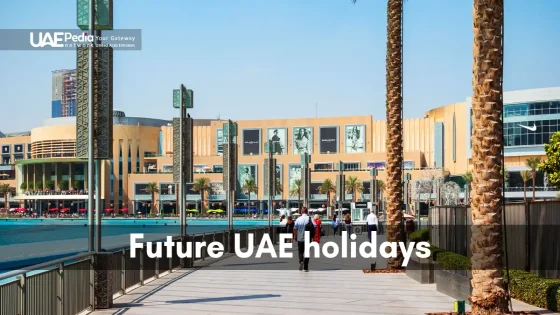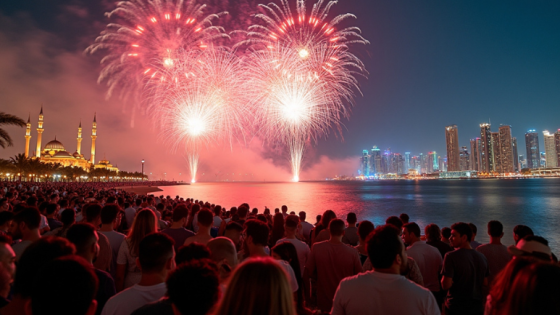Dubai New Year 2025 promises to be a spectacular occasion, featuring enchanting celebrations across iconic Dubai venues. As we count down the minutes to the new year, revelers can enjoy breathtaking views of Dubai while experiencing the magnificent Burj Khalifa fireworks. With options like the New Year’s Eve Garden Brunch and a half-day Dubai city tour, it’s time to unite and celebrate the New Year in unforgettable style!
Key Events for Dubai New Year 2025
Dubai New Year 2025 vows to be an extraordinary celebration, bursting with excitement and vibrant festivities. As the clock strikes midnight, the city will light up with spectacular fireworks displays, centered around iconic landmarks such as the Burj Khalifa and Dubai Marina. This year, the festivities will include world-class concerts featuring renowned artists, cultural performances that showcase the rich heritage of the UAE, and family-friendly attractions in bustling public spaces.
Unique events, such as immersive light shows and themed parties at luxurious hotels, will create unforgettable experiences for visitors and locals alike. With diverse celebration packages available, there’s something for everyone to enjoy, making this New Year’s Eve in Dubai a truly magical occasion you won’t want to miss!
Fireworks Displays at Iconic Locations

As the clock approaches midnight, Dubai New Year 2025 will deliver an unforgettable spectacle with dazzling fireworks displays set against the backdrop of the city’s most iconic locations. The Burj Khalifa, the tallest building in the world, will once again take center stage, lighting up the night sky with a breathtaking pyrotechnic show that attracts thousands of spectators. Dubai Marina will host its breathtaking display aboard luxury yachts, creating a picturesque setting where the reflections of fireworks dance on the water.
Other hotspots, like the beach at Jumeirah and the expansive Global Village, promise to enchant visitors with synchronized music and colorful explosions. These stunning events not only mark the beginning of a new year but also showcase Dubai’s commitment to creating magical experiences, ensuring that all attendees are left in awe of the city’s vibrant spirit and breathtaking beauty.
Read more: UAE Fireworks: Spectacular Shows to Watch This in dubai new year 2025
Concerts and Live Performances
This year, Dubai New Year 2025 will be electrified by an array of concerts and live performances featuring some of the world’s biggest stars. Music lovers can look forward to an impressive lineup of both international and local artists, spanning genres from pop and rock to traditional Arabic music. Venues such as the Dubai Opera and outdoor stages at iconic locations like Burj Park will host unforgettable shows, creating a festive atmosphere that resonates throughout the city.
Attendees can enjoy a night of lively tunes, spectacular performances, and infectious energy that brings people together in celebration. Whether you’re dancing under the stars at a beachfront concert or enjoying a sophisticated evening at a luxurious hotel, the live performances during this New Year’s Eve will elevate the celebratory spirit, making it a night to remember for everyone in attendance.
Read more: UAE holiday calendar for 2025
Overview of Cultural Events and Festivals During New Year
The city will pulse with a vibrant tapestry of cultural events and festivals that showcase the rich heritage and diversity of the UAE. From traditional dance performances to art exhibitions and food festivals, visitors can immerse themselves in a festive celebration that reflects the spirit of Dubai. Iconic venues such as Al Seef and Dubai Festival City will transform into lively hubs of activity, featuring artisan markets, cultural showcases, and interactive workshops.
Families can enjoy performances that highlight Emirati folklore and contemporary art, while children can participate in fun activities and educational experiences. This blend of tradition and modernity not only enriches the New Year celebrations but also fosters understanding and appreciation of the UAE’s cultural mosaic, ensuring that everyone leaves with unforgettable memories of their time in this enchanting city.
Exclusive Celebration Packages for Tourists

For those planning to experience Dubai New Year 2025, a variety of exclusive celebration packages tailor-made for tourists promise an unforgettable night of luxury and festivity. These packages often include prime viewing spots for the mesmerizing fireworks displays at iconic sites like the Burj Khalifa and Dubai Marina, along with gourmet dining experiences at renowned restaurants. Guests can indulge in lavish buffets featuring both international cuisine and local delicacies, accompanied by live entertainment and DJ performances.
Many packages also offer additional perks, such as transportation services, VIP access to exclusive parties, and guided tours of the city’s breathtaking attractions. Whether you choose a rooftop gala, a cruise along the Dubai Creek, or an upscale hotel celebration, these carefully curated experiences ensure that visitors can ring in the New Year with style, creating lasting memories in one of the world’s most captivating destinations.
| Exclusive Celebration Packages | Celebration Package Times |
| Fireworks Gala Dinner | 7:00 PM – 1:00 AM |
| Luxury Yacht Cruise | 8:00 PM – 12:30 AM |
| Rooftop Party at Burj Khalifa | 9:00 PM – 1:00 AM |
| Family-Friendly Festival | 6:00 PM – 11:00 PM |
| Desert Safari New Year | 3:00 PM – 12:00 AM |
| Beachfront Celebration | 7:30 PM – 1:00 AM |
| Cultural Evening at Global Village | 5:00 PM – 12:00 AM |
Special Packages and Offers
As Dubai New Year 2025 approaches, tourists can take advantage of a variety of enticing special packages and offers designed to enhance their celebratory experience. Many hotels and resorts are unveiling exclusive deals that combine luxurious accommodations with festive amenities, such as complimentary dinners and access to highly anticipated events. Additionally, popular attractions are offering discounted entry with bundled packages, allowing visitors to explore the city’s wonders while enjoying the New Year festivities.
For those seeking a more immersive experience, themed celebration packages, including Arabian nights and gala affairs, promise a unique blend of culture, entertainment, and culinary delights. With such an array of options, tourists can find the perfect package to create unforgettable memories as they usher in the new year amidst the dazzling lights and vibrant atmosphere of Dubai.
Dining Experiences and Reservations
This New Year’s Eve, Dubai New Year 2025 offers an exceptional array of dining experiences that promise to delight food lovers seeking a memorable night. Renowned restaurants across the city are curating special multi-course menus, featuring gourmet dishes crafted by top chefs that blend international flavors with local cuisine. From elegant rooftop venues overlooking the stunning firework displays to luxurious waterfront dining settings, guests can savor exquisite meals while reveling in the festive atmosphere.
Many establishments also offer beverage packages that include celebratory drinks, making it easy to toast to new beginnings. Given the high demand for these exclusive dining experiences, reservations are highly recommended; securing a table well in advance ensures that you won’t miss out on an unforgettable evening filled with culinary delights and stunning views that perfectly complement the New Year celebrations in Dubai.
Read more: UAE Commemoration Day: Honoring the Brave
Best Viewing Spots for Fireworks in Dubai
Securing the perfect spot to witness the mesmerizing fireworks is a top priority for many revelers. The iconic Burj Khalifa remains the prime location, with its breathtaking display lighting up the skyline and creating a magical experience for onlookers.
For those seeking a stunning waterfront view, the Dubai Marina offers a picturesque setting where fireworks reflect off the water, complemented by the vibrant atmosphere of surrounding restaurants and cafes.
Jumeirah Beach is another fantastic choice, providing ample space to enjoy the show alongside friends and family while relaxing on the sandy shores. Additionally, viewers can head to Al Seef or the Global Village for a festive ambiance, combining cultural experiences with panoramic views of the displays. Whichever spot you choose, the sights and sounds of Dubai’s New Year fireworks will undoubtedly create unforgettable memories as you ring in the new year.
Travel Tips for New Year’s Eve in Dubai 2025
Dubai New Year 2025 offers an exciting celebration filled with dazzling fireworks and vibrant festivities, but to truly enjoy the experience, consider these essential travel tips:
- Book Early: Reserve accommodations and celebration packages well in advance to secure the best options.
- Choose Your Viewing Spot: Popular locations like the Burj Khalifa, Dubai Marina, and Jumeirah Beach can fill up quickly.
- Arrive Early: Get to your selected viewing area hours before the festivities begin to ensure a prime spot.
- Use Public Transport: Opt for the metro or rideshare services to avoid traffic and parking difficulties.
- Make Dining Reservations: Book your restaurant well in advance to enjoy a festive meal without the wait.
- Stay Hydrated: Bring water and light snacks if you plan to spend time outdoors.
- Dress Comfortably: Wear comfortable shoes and be prepared for cooler evening weather.
- Embrace the Culture: Participate in local traditions and enjoy the diverse celebration atmosphere to enhance your experience.
Read more: Eid Al Fitr in UAE: Celebrating the End of Ramadan
Best Times to Book Flights and Hotels
When planning for Dubai New Year 2025, timing is crucial for securing the best deals on flights and hotels. Ideally, travelers should aim to book their accommodations and flights at least three to six months in advance, as prices tend to soar as the date approaches. The peak booking period typically begins in September, so early fall is the sweet spot for snagging competitive rates. For the best hotel options, consider staying in areas close to popular fireworks viewing sites, such as Downtown Dubai or Dubai Marina.
Additionally, be flexible with your travel dates; flying mid-week can often yield significant savings compared to weekend departures. Monitoring fare alerts and using comparison websites can also help you find the best deals. By planning, you can ensure a hassle-free arrival in this vibrant city, ready to celebrate the New Year in style.
Read more: Observing Day of Arafat in UAE: A Day of Devotion
Navigating During Dubai New Year 2025
Navigating Dubai during the New Year can be an exhilarating yet busy experience, as the city transforms into a vibrant festival of lights and celebrations. To make the most of your festivities, leveraging Dubai’s efficient public transportation system is highly recommended. The metro is a convenient option, especially with extended service hours on New Year’s Eve, ensuring easy access to major attractions and events. For those traveling in groups or with family, rideshare apps offer a hassle-free way to reach your destination without worrying about parking.
Expect increased traffic congestion around popular venues, so plan to arrive early or consider walking to your event when possible. Additionally, downloading local navigation apps can help you find the best routes and alternatives. With a little planning, you can seamlessly navigate the city, soaking in the excitement of the celebrations while enjoying everything Dubai has to offer.
Public Transport Options and Best Routes

Utilizing the city’s extensive public transport options can greatly enhance your celebration experience. Dubai boasts a reliable and efficient network of metro, buses, and water taxis, making it easy to navigate the hustle and bustle of New Year’s festivities. Here are the best public transport options and routes to consider:
- Dubai Metro: Use the Red Line for quick access to major attractions like Burj Khalifa and Dubai Mall. Extended service hours on New Year’s Eve make it a top choice.
- Buses: Connect to various parts of the city, with numerous routes leading to popular viewing spots. Check routes 8 and 29 for downtown access.
- Water Taxis: A scenic way to travel, especially around Dubai Marina and the Creek. Look for routes that connect to areas with fireworks displays.
- Tram: Ideal for getting around the Marina area, providing easy access to waterfront festivities.
Tips for Avoiding Traffic and Crowds
Keeping traffic and crowds at bay is key to enjoying the festivities without stress. Here are some effective tips to help you navigate the busy streets and find a perfect spot for the celebrations:
- Arrive Early: Aim to be at your chosen location several hours before midnight to secure a good viewing spot.
- Use Public Transport: Rely on the metro, which operates late on New Year’s Eve. This can help you avoid traffic jams.
- Choose Alternative Viewing Areas: Explore lesser-known spots like Al Seef or the Dubai Frame, which offer fantastic views without the huge crowds.
- Plan Your Route: Check transport schedules and potential road closures ahead of time to avoid delays.
- Carpool: If driving, share the ride with friends to minimize the number of vehicles on the road.
- Celebrate Early: Consider attending pre-New Year events to enjoy the festive atmosphere without the peak crowd levels.
Exploring Trends and Expectations for Dubai New Year 2025

Dubai New Year 2025 is appointed to dazzle with a myriad of exciting trends and heightened expectations that reflect the city’s flair for grand celebrations. Following the previous years’ highlights, festival-goers can anticipate innovative fireworks displays, themed experiences, and extravagant parties that showcase Dubai’s uniqueness. Sustainability is a growing focus, with many events aiming to reduce environmental impact while offering beautiful, eco-friendly decor and experiences. Expect a diverse range of global cuisines at celebratory venues, appealing to both local and international guests.
In addition, live entertainment featuring top musicians and performance artists will enrich the festive atmosphere. With the city’s iconic skyline as a backdrop, guests are eager to experience luxurious celebrations at world-renowned hotels and exclusive rooftop parties. As the countdown to midnight approaches, the excitement will be palpable, making Dubai New Year 2025 a not-to-be-missed event for travelers from around the globe.
Popular Themes and Concepts for 2025
It’s important to gear up for a vibrant array of themes and concepts that make the celebrations unforgettable. This year, expect a fusion of tradition and modernity, with many venues embracing a “Futuristic Glitz” theme that showcases cutting-edge technology and neon aesthetics. Elegant masquerade balls and opulent Arabian Nights-inspired parties will also be popular, offering immersive experiences that blend cultural elements with luxury.
Eco-conscious celebrations are on the rise, with sustainability-themed events emphasizing green practices without sacrificing style. Family-friendly experiences—complete with fun activities, live performances, and kid-centric zones—are also in vogue, ensuring that guests of all ages feel included. As hotels and venues pull out all the stops, the creative concepts will elevate the festive atmosphere, making Dubai a premier destination for ringing in the New Year in style.
Technology Integration in Events (Live Streaming)
The integration of technology, particularly live streaming, is set to enhance the celebratory experience for both in-person attendees and remote viewers. With the unprecedented demand for virtual participation, many events will feature high-quality live streams that broadcast spectacular fireworks and performances, allowing global audiences to partake in the festivities from the comfort of their homes. Cutting-edge technology, such as 360-degree cameras and augmented reality elements, will create immersive experiences that engage viewers in real time, making them feel as though they are part of the celebration.
Additionally, interactive social media campaigns will encourage users to share their experiences, driving a sense of community and excitement beyond the physical boundaries of the event. This blend of technology and tradition not only broadens the reach of Dubai’s iconic New Year celebrations but also ensures that everyone can join in on the magic, regardless of their location.
Sentiment Analysis of Dubai New Year Celebrations 2025

Sentiment analysis reveals an overwhelming sense of excitement and anticipation among residents and visitors alike. Social media platforms are buzzing with positive discussions about the upcoming celebrations, highlighting the city’s reputation for hosting spectacular events. Enthusiastic posts reflect a desire to experience the innovative fireworks displays, luxurious parties, and vibrant atmosphere that Dubai is known for. Many are particularly excited about the integration of technology, such as live streaming options, which allow friends and family from around the world to join in the festivities.
Additionally, there is a growing appreciation for sustainable practices being adopted in this year’s events, resonating well with eco-conscious attendees. Overall, the sentiment surrounding Dubai New Year 2025 is one of joy and inclusivity, setting the stage for an unforgettable night that promises to create lasting memories for all.
Overview of Sentiment Analysis Techniques
In the context of Dubai New Year 2025, sentiment analysis techniques play a crucial role in understanding public perception and excitement surrounding the celebrations. These techniques utilize natural language processing (NLP) and machine learning algorithms to analyze vast amounts of data from social media platforms, forums, and blogs. By categorizing sentiments into positive, negative, or neutral, analysts can gauge overall public mood. Common methods include keyword extraction, which identifies frequently mentioned terms related to the event, and sentiment scoring, which assigns values to expressions based on their emotional tone.
Advanced techniques, such as deep learning models, can further enhance accuracy by understanding context and nuances in language. This comprehensive analysis not only helps event organizers tailor their offerings to meet audience expectations but also provides valuable insights into emerging trends and themes, ensuring that Dubai’s New Year celebrations remain vibrant and engaging for all attendees.
Key Platforms Analyzed (Twitter, Instagram, Facebook)
In the lead-up to Dubai New Year 2025, sentiment analysis focuses on key social media platforms such as Twitter, Instagram, and Facebook, each offering unique insights into public sentiment and engagement. Twitter, with its real-time updates, serves as a pulse check for immediate reactions and trending topics related to the New Year celebrations. Instagram captures visual excitement through vibrant photos and videos, allowing analysts to gauge enthusiasm through likes and comments, showcasing people’s anticipation for fireworks and events.
Meanwhile, Facebook provides a more comprehensive view through community interactions and event pages, revealing how individuals plan to celebrate and share their experiences. By analyzing discussions, hashtags, and engagement metrics across these platforms, organizers can better understand audience preferences and trends, ensuring that Dubai’s New Year festivities resonate with both locals and international visitors for an unforgettable night.
Visitor Experiences and Reviews from Previous Years
As anticipation builds for Dubai New Year 2025, reflections on visitor experiences and reviews from previous celebrations highlight what makes this event truly unforgettable. Many guests rave about the breathtaking fireworks that light up the iconic skyline, with comments emphasizing the spectacular views from various vantage points, including Burj Khalifa and the Dubai Marina. The blend of luxury and culture in themed parties has received high praise, with visitors describing their nights as enchanting, filled with live entertainment, exquisite dining, and vibrant atmospheres.
Attendees often share stories of connecting with friends and families, creating cherished memories in a city that thrives on celebration. While some suggest arriving early to secure prime spots, the overall sentiment is overwhelmingly positive, with guests eager to return for another magical experience of grandeur and joy. These reviews not only highlight the allure of Dubai during New Year’s Eve but also set a high expectation for the upcoming festivities in 2025.
Read more: Melodies of Celebration: UAE Holiday Music Traditions
Conclusion
Dubai New Year 2025 is set to be an extraordinary celebration, bringing together people from all walks of life to ring in the new year at iconic Dubai venues. With thrilling experiences like the spectacular Burj Khalifa fireworks lighting up the sky, this New Year’s Eve in Dubai will leave lasting memories. The excitement will begin just minutes before the new year with events tailored for everyone, from lavish parties to intimate gatherings.
Don’t miss the exclusive New Year’s Eve Garden Brunch, where you can indulge in delectable cuisine while enjoying breathtaking 360-degree views of Dubai. For those wanting to explore more, a half-day Dubai city tour is an excellent way to immerse yourself in the vibrant culture and stunning architecture.
As we embrace the essence of unity this New Year, let’s celebrate the joys of togetherness and hope for the year ahead. So, gather your friends and family, reserve your celebration packages, and prepare for a night filled with joy, fireworks, and unforgettable moments. Join us to celebrate the arrival of 2025 in style!



















